The Borders villages on the energy storage frontline
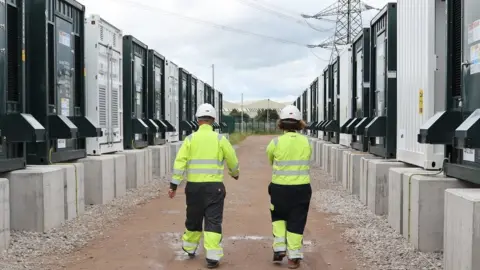 Zenobe
ZenobeAs you sweep in from Kelso towards the Borders villages of Birgham, Eccles and Leitholm it looks picture perfect in the late autumn sunshine.
It does not - at first glance - appear like a battle ground for meeting national energy provision needs.
Two Battery Energy Storage Systems (BESS) have already been approved - with more on the Berwickshire horizon.
Some residents fear a "gold rush" of proposals, further and further away from the local electrical substation.
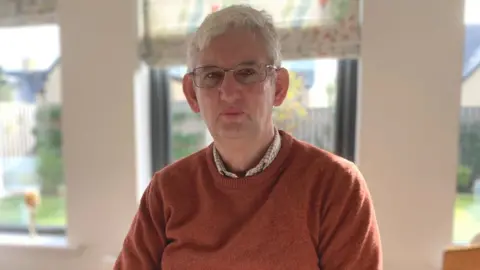
Bob Hope, who chairs the local community council, said they took a "pragmatic approach" to the first three proposals in the area.
However, they fear they could become the target of many more developments due to their location.
"The UK, like the rest of the world, is going through transition from fossil fuels to renewable energy," he said.
"The grid is trying to catch up with the process because the grid initially was set up to take power from big power stations and all of a sudden it's having to take power from lots of small generators, if you like.
"And one of the the key substations in the process is situated at Eccles."
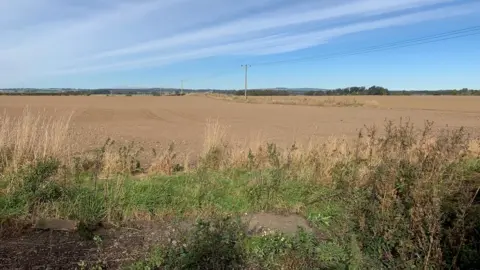
BESS are devices that enable energy from the likes of solar and wind farms to be stored and used when the power is needed most.
Lithium-ion batteries, used in mobile phones and electric cars, are currently the "dominant storage technology" for large-scale plants.
Mr Hope said he understood the "strategic" role the Eccles substation had to play as it provides electricity to the north east of England.
"The real challenge we've got is that we now have battery storage developments coming out the woodwork or planning applications for them all over the place," he said.
"We have some of the best arable fields in Scotland and all of a sudden they're being planned to turn them into concrete wildernesses.
"As far as we are concerned we are being industrialised by stealth."
He has written to the Scottish government to ask for developments to be put on hold while a national strategy is developed.
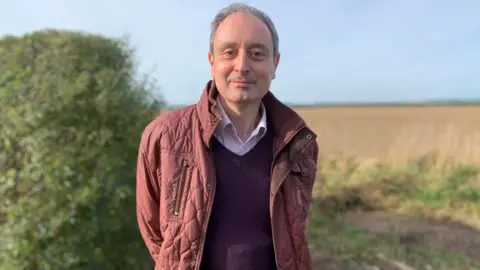
James Finnie has lived near Leitholm for 17 years, next to one site being considered for a BESS project.
He had been hoping to sell his home this year to downsize but said that once the proposals emerged he was told the house sale was "dead" or the asking price would need to be slashed.
He compared the flood of applications in the area to a modern-day "gold rush".
"It just completely changes everyone's way of life," he said. "You look at the view - you're talking five miles of view into open countryside - that will be completely removed.
"It is not just something that is happening in a corner somewhere - it is a mass replacement of agricultural land with industrial plant."
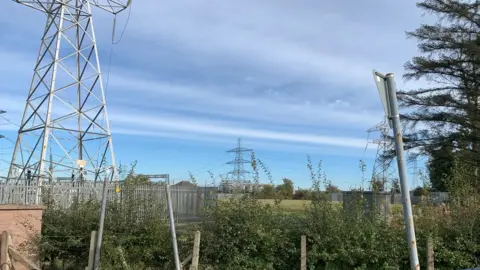
He said he believed there was a place for BESS but it should either be next to a substation or wind farm or on "non-prime land".
He said to give permission at other locations, like the one near his home, would be "crossing the Rubicon" and also called for strategic planning guidance.
One of the firms behind a development in the area, Zenobe, plans to install hundreds of storage units on farmland.
Head of project development James Smith said Eccles had been identified as a "one of the key constraints on the entire UK network" and a "real bottleneck" in the system.
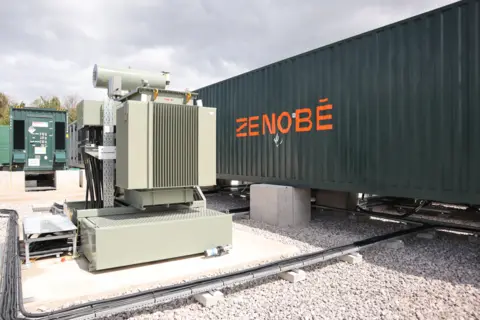 Zenobe
ZenobeHe added that he did not believe all the potential developments in the area would ultimately go ahead and some would inevitably "fall away".
However, he said he believed the Zenobe project fulfilled an important need.
He said: "This is about allowing a greater uptake of renewable energy and being able to transmit that energy from the areas of generation in Scotland to the areas of demand across the rest of the UK.
"I am very proud of this particular scheme in this particular location but I can understand the anxiety from the local community about the number of applications that are coming through."
The Scottish government said "bold action" was needed to tackle the climate emergency.
"As our renewable generation capacity increases, there will be a growing need for suitable storage and flexibility to manage the differences between generation and demand, with battery storage being one of the solutions," it said in a statement.
"We have some of the most stringent environmental impact regulations anywhere in the world and our planning and consenting systems ensure that local communities can have their say."
It added that it was aware of the proposals in Eccles but said that given one of them was a live application it would not be appropriate to comment further.

Follow the BBC for the South of Scotland on X. Listen to news from the Scottish Borders and Dumfries and Galloway on BBC Sounds. If you have a story for us email [email protected] or [email protected].
